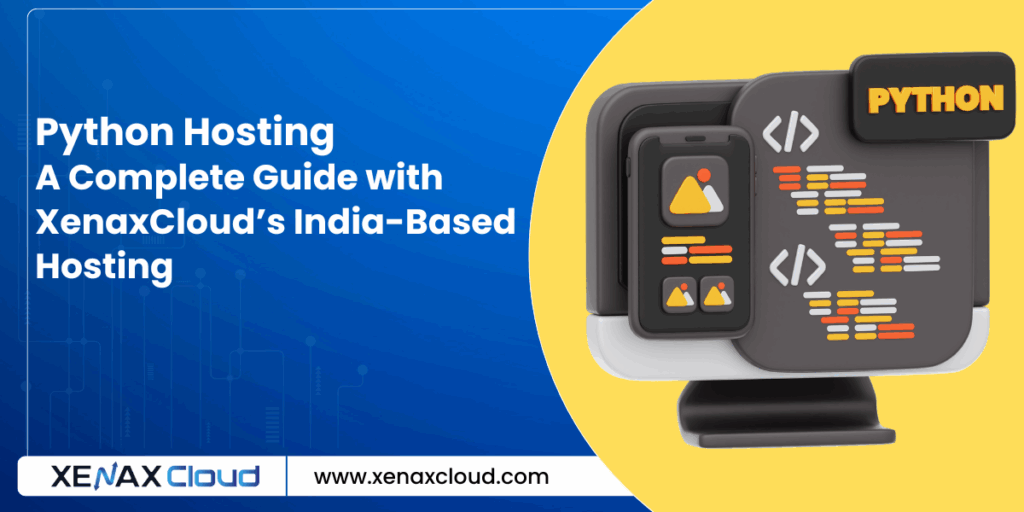Python’s versatility makes it a top choice for web development, data science, and automation, driving demand for reliable python hosting. Whether you’re building a Django web app, a Flask API, or a machine learning model, choosing the right hosting provider is crucial. XenaxCloud, with its India-based data center, offers tailored hosting solutions—Shared Hosting, VPS, Indian RDP, Dedicated Servers, Domains, and Reseller Hosting—optimized for Python applications. This comprehensive guide covers python hosting, setup steps, the pitfalls of free python hosting, and why XenaxCloud is the ideal partner for Indian businesses.
What Is Python Hosting?
Python hosting refers to server environments optimized for running Python applications, such as web apps, APIs, or scripts. Python is a high-level, interpreted language known for its simplicity and versatility. Key features include:
- Framework Support: Compatible with Django, Flask, and FastAPI.
- Scalability: Handles web apps to data-intensive tasks.
- Community: Extensive libraries for web development and AI.
XenaxCloud’s India-based servers ensure low-latency performance for Python apps, making it ideal for Indian developers.
Why Choose Python Hosting?
- Versatility: Supports web apps, APIs, and data science projects.
- Performance: Fast execution with optimized server configurations.
- Scalability: Easily scales with traffic on VPS.
- Security: XenaxCloud’s free SSL certificates protect Python apps.
- Reliability: Avoids the limitations of free python hosting.
Pitfalls of Free Python Hosting
While free python hosting may seem appealing, it comes with drawbacks:
- Limited Resources: Low CPU, RAM, and storage cap performance.
- Uptime Issues: Frequent downtime affects user experience.
- Security Risks: Lack of SSL and firewalls.
- No Support: Limited or no customer assistance.
- Ads or Branding: Free hosts may add unwanted ads.
XenaxCloud’s paid plans offer affordable, reliable python hosting with 24/7 support, free SSL, and India-based infrastructure.
Steps to Set Up Python Hosting with XenaxCloud
Follow these steps to deploy your Python application with XenaxCloud’s hosting solutions:
Step 1: Choose a Hosting Plan
Select a XenaxCloud plan based on your app’s needs:
- Shared Hosting: ₹100–₹500/month for small Python apps.
- VPS: ₹1000–₹5000/month for scalable applications.
- Dedicated Servers: ₹5000–₹20,000/month for high-performance apps.
- Reseller Hosting: ₹1000–₹5000/month for hosting multiple clients.
Step 2: Register a Domain
- Choose a Domain: Opt for a .in domain via Domains (₹500–₹2000/year) for local SEO.
- Configure DNS: Point your domain to XenaxCloud’s server IP.
- Verify Availability: Use XenaxCloud’s domain search tool.
Step 3: Set Up Your Server
- Choose an OS: Use Linux (e.g., Ubuntu) for Python compatibility.
- Access Server: Connect via Indian RDP or SSH for secure management.
- Install Control Panel:
- Use cPanel for Shared Hosting.
- Use Plesk for VPS or Dedicated Servers.
Step 4: Install Python
- Update Server:
sudo apt update && sudo apt upgrade -y - Install Python:
- Install Python 3 and pip:
sudo apt install python3 python3-pip -y - Verify installation:
python3 --version pip3 --version
- Install Python 3 and pip:
- Manage via RDP: Use Indian RDP for secure setup.
Step 5: Deploy Your Python Application
- Create Project Directory:
mkdir ~/myapp && cd ~/myapp - Set Up Virtual Environment:
python3 -m venv venv source venv/bin/activate - Install Dependencies:
- Example for Flask:
pip install flask
- Example for Flask:
- Create a Sample App:
- Create
app.py:from flask import Flask app = Flask(__name__) @app.route('/') def home(): return 'Hello from XenaxCloud!' if __name__ == '__main__': app.run(host='0.0.0.0', port=5000)
- Create
- Run the App:
python3 app.py
Step 6: Configure a Process Manager
Use Gunicorn with Supervisor to keep your Python app running:
- Install Gunicorn:
pip install gunicorn - Test Gunicorn:
gunicorn --bind 0.0.0.0:5000 app:app - Install Supervisor:
sudo apt install supervisor -y - Configure Supervisor:
- Create a configuration file:
sudo nano /etc/supervisor/conf.d/myapp.conf - Add:
[program:myapp] directory=/home/user/myapp command=/home/user/myapp/venv/bin/gunicorn --bind 0.0.0.0:5000 app:app user=user autostart=true autorestart=true stderr_logfile=/var/log/myapp.err.log stdout_logfile=/var/log/myapp.out.log
- Create a configuration file:
- Start Supervisor:
sudo supervisorctl reread sudo supervisorctl update sudo supervisorctl start myapp
Step 7: Set Up a Reverse Proxy (Nginx)
- Install Nginx:
sudo apt install nginx -y - Configure Nginx:
- Create a configuration file:
sudo nano /etc/nginx/sites-available/myapp - Add:
server { listen 80; server_name yourdomain.com www.yourdomain.com; location / { proxy_pass http://localhost:5000; proxy_set_header Host $host; proxy_set_header X-Real-IP $remote_addr; proxy_set_header X-Forwarded-For $proxy_add_x_forwarded_for; } }
- Create a configuration file:
- Enable Configuration:
sudo ln -s /etc/nginx/sites-available/myapp /etc/nginx/sites-enabled/ sudo nginx -t sudo systemctl reload nginx
Step 8: Enable SSL for Security
- Install Certbot:
sudo apt install certbot python3-certbot-nginx -y - Obtain SSL Certificate:
sudo certbot --nginx -d yourdomain.com -d www.yourdomain.com - Verify HTTPS:
- Visit
https://yourdomain.comto confirm secure access.
- Visit
- Use XenaxCloud’s Free SSL: Available with all plans for quick setup.
Step 9: Test and Optimize
- Test Your App:
- Access your domain to verify the Python app is running.
- Check logs with
tail -f /var/log/myapp.out.log.
- Optimize Performance:
- Enable caching with Nginx or a CDN.
- Use XenaxCloud’s performance tools for monitoring.
- Ensure Uptime: XenaxCloud’s 99.5% uptime guarantees reliability.
Step 10: Scale as Needed
- Upgrade from Shared Hosting to VPS or Dedicated Servers for growing apps.
- Use Reseller Hosting to host client Python apps.
Why Choose XenaxCloud for Python Hosting?
XenaxCloud is the ideal hosting provider for Indian businesses, offering:
- Low Latency: Fast performance via India-based data center.
- Data Compliance: Adheres to India’s data protection laws.
- Local Support: 24/7 assistance in Hindi, English, and other Indian languages.
- Security: Free SSL certificates and firewalls protect Python apps.
- Scalability: Supports apps from startups to enterprises.
Here’s how XenaxCloud’s services support python hosting:
Shared Hosting
Shared Hosting is ideal for small Python apps:
- Affordable: Starts at ₹100/month.
- 99.5% Uptime: Ensures constant availability.
- Free SSL Certificates: Secures your app.
- cPanel Access: Simplifies management.
VPS Hosting
VPS offers flexibility:
- Root Access: Install Python, Gunicorn, and Supervisor.
- Scalable Resources: Adjust CPU, RAM, and storage.
- India-Based Servers: Low latency for Indian users.
Indian RDP
Indian RDP provides secure management:
- Seamless Connectivity: Access Python servers from India.
- Strong Security: Protects app configurations.
- Affordable Plans: Budget-friendly for developers.
Dedicated Servers
Dedicated Servers deliver performance:
- Exclusive Resources: Handles high-traffic Python apps.
- Custom Configurations: Optimized for Python frameworks.
- India-Based Access: Fast performance for local users.
Domain Registration
Domains enhance branding:
- Competitive Pricing: .in domains start at ₹500/year.
- Easy DNS Management: Simplifies Python app setup.
- Local Appeal: Boosts SEO for Indian audiences.
Reseller Hosting
Reseller Hosting lets you host client apps:
- White-Label Branding: Offer python hosting under your brand.
- Scalable Resources: Support multiple clients.
- 24/7 Support: XenaxCloud handles technical issues.
Benefits of India-Based Hosting with XenaxCloud
XenaxCloud’s India-based data center enhances python hosting:
- Low Latency: Fast app performance for Indian users.
- Data Compliance: Meets India’s data protection regulations.
- Local Support: 24/7 assistance in multiple Indian languages.
- Cost-Effective: Affordable plans outperform free python hosting.
- Security: Protects Python apps with SSL and firewalls.
Tips to Optimize Python Hosting
- Use Virtual Environments: Isolate dependencies for each app.
- Leverage Gunicorn: Ensure efficient app serving.
- Enable SSL: Prevent security issues with XenaxCloud’s free SSL.
- Monitor Performance: Use XenaxCloud’s tools to track resources.
- Use RDP: Manage servers securely with Indian RDP.
Common Use Cases
- Startups: Host Django apps on Shared Hosting or VPS.
- Data Scientists: Run machine learning models on Dedicated Servers.
- Developers: Deploy Flask APIs with custom configurations.
- Hosting Businesses: Offer python hosting via Reseller Hosting.

FAQs
- What is python hosting?
Python hosting involves hosting Python applications like Django or Flask on optimized servers, supported by XenaxCloud’s VPS. - What are the risks of free python hosting?
Free python hosting often lacks uptime, security, and support, unlike XenaxCloud’s reliable plans with free SSL. - How do I set up python hosting with XenaxCloud?
Choose VPS, install Python, deploy your app, and secure with SSL, manageable via Indian RDP. - Why choose XenaxCloud for python hosting?
XenaxCloud’s India-based data center offers low latency, data compliance, and 24/7 support for seamless python hosting. - Can I start a hosting business with XenaxCloud?
Yes, Reseller Hosting supports python hosting for multiple clients under your brand.
Conclusion
Python hosting is essential for deploying scalable, secure, and high-performance applications. XenaxCloud’s India-based hosting solutions—Shared Hosting, VPS, Indian RDP, Dedicated Servers, Domains, and Reseller Hosting—provide the perfect environment for Python apps, outperforming free python hosting. With low latency, data compliance, and 24/7 local support, XenaxCloud empowers Indian businesses to succeed. Explore XenaxCloud’s offerings at XenaxCloud.com and launch your Python app today!






